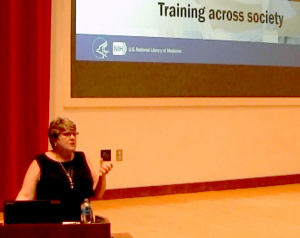 Patricia Flatley Brennan, RN, PhD, Director of the National Library of Medicine (NLM), visited the University of Pittsburgh on Tuesday, July 17, and presented a talk on “Transforming Data into Knowledge and Knowledge into Health: NLM Strategic Plan, 2017-2027.” Founded in 1836 as the library of the U.S. Army Surgeon General, NLM is headquartered in Bethesda, Maryland. Since its founding, it has played a pivotal role in translating biomedical research into practice. NLM is the world’s largest biomedical library and developer of electronic information services. In a single day the NLM delivers, not millions or billions, but trillions of bytes of data to millions of scientists, health professionals and members of the general public. NLM provides access to scientific and health information whenever and wherever it is needed—on scene at emergencies and disasters, in laboratories, health care facilities, libraries, schools, offices, homes, and on the road. Access to NLM resources is quick, convenient, and free of charge to people around the world.
Patricia Flatley Brennan, RN, PhD, Director of the National Library of Medicine (NLM), visited the University of Pittsburgh on Tuesday, July 17, and presented a talk on “Transforming Data into Knowledge and Knowledge into Health: NLM Strategic Plan, 2017-2027.” Founded in 1836 as the library of the U.S. Army Surgeon General, NLM is headquartered in Bethesda, Maryland. Since its founding, it has played a pivotal role in translating biomedical research into practice. NLM is the world’s largest biomedical library and developer of electronic information services. In a single day the NLM delivers, not millions or billions, but trillions of bytes of data to millions of scientists, health professionals and members of the general public. NLM provides access to scientific and health information whenever and wherever it is needed—on scene at emergencies and disasters, in laboratories, health care facilities, libraries, schools, offices, homes, and on the road. Access to NLM resources is quick, convenient, and free of charge to people around the world.
Watch the full recorded lecture by Brennan:
According to Brennan, the NLM’s ten-year plan for biomedical discovery and data-powered health will keep the Library in position to carry out its congressionally-mandated mission and to support the vitally important work of the NIH by creating a future in which data and information transform and accelerate biomedical discovery and improve health and health care. The strategic plan’s focus is on three essential, interdependent goals:
- to accelerate discovery and advance health through data-driven research;
- to reach more people in more ways through enhanced dissemination and engagement; and
- to build a workforce for data-driven research and health.
Brennan emphatically said, “We must become an engine for discovery. We must foster an ecosphere of discovery.”
In conjunction with communicating the ten-year strategic plan, Brennan’s presentation also gave an articulate voice to the All of Us Research Program. The goal of this exciting new NIH initiative is to speed up health research and medical breakthroughs that can lead to new individualized approaches to disease prevention, diagnosis, and treatments, in what is known as precision medicine. To accomplish this objective, a total of one million people nationwide are being invited to come together to create the largest health database of its kind. This diverse database will provide researchers with the information they need to help advance precision medicine and create a healthier future for generations to come.
Brennan pointed out the reality of what has been a “very pale and very male” research infrastructure and underscored the urgent need to replace it with one that reflects a diversity of people, data types, and ways of life. She added that the key to the All of Us program lies in its diversity because the more we know about what makes people unique, the more customized health care can become.
Brennan noted the University of Pittsburgh’s efforts spearheading All of Us Pennsylvania, the initiative’s Pennsylvania arm. Pitt is in the process of enrolling 120,000–150,000 people who will help to form the one million total in the All of Us national database.
Brennan concluded her talk by enthusiastically declaring that, “We’re out to change the world. I don’t have the answer, but I want to be part of the conversation.”
~Donna Perkins